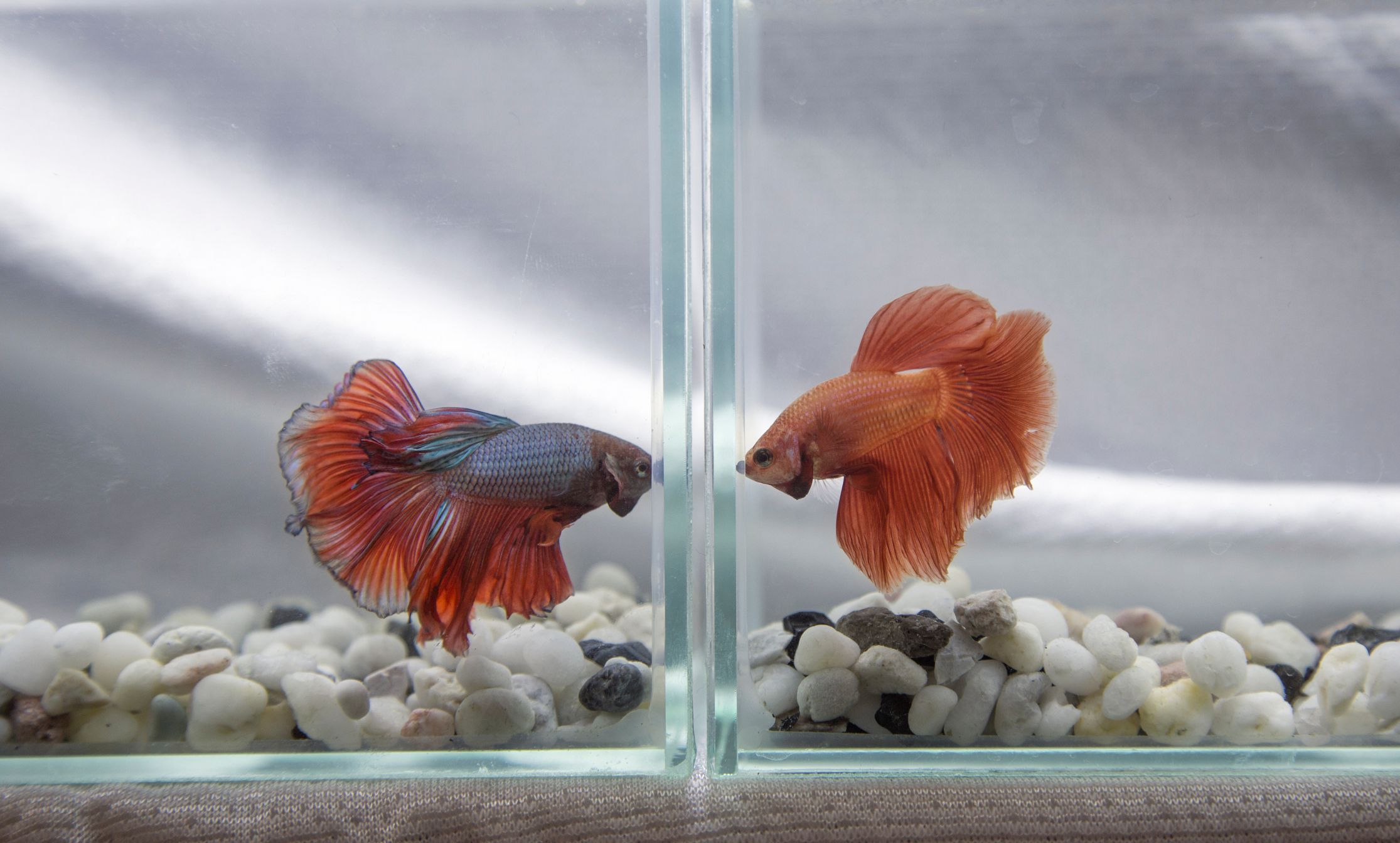If you’re a proud owner of a Betta fish, you know that they are known for their vibrant colors and playful personalities. However, sometimes your fish might act differently than usual, and you might wonder why. In this article, we’ll explore some of the most common reasons why your Betta fish might be behaving in a certain way, and what you can do to help them.
From swimming erratically to not eating, there are many things that might cause your Betta fish to behave in an unusual way. But don’t worry, with the right knowledge and care, you can ensure that your fish stays happy and healthy. So let’s dive into the reasons why your Betta fish might be doing this, and how you can help them feel better.

Reasons Why Your Betta Fish Might Be Doing This
Betta fish are popular pets that are known for their vibrant colors and unique personalities. However, sometimes these pets may exhibit behaviors that are concerning to their owners. In this article, we will discuss some of the reasons why your betta fish may be doing certain things, and what you can do to help them.
1. Not Eating
If your betta fish is not eating, it could be due to a number of reasons. One of the most common reasons is that the water temperature is too low. Betta fish thrive in warm water, so if the temperature is below 74 degrees Fahrenheit, they may not have an appetite. Additionally, if the water pH is too low, it could also affect their appetite. Make sure to test the water regularly and adjust the temperature and pH as needed.
Another reason why your betta fish may not be eating is if they are stressed. Stress can be caused by a number of factors, such as a new environment, aggressive tank mates, or inadequate hiding spots. Make sure to provide a comfortable and stress-free environment for your betta fish.
2. Swimming Erratically
If your betta fish is swimming erratically, it could be a sign of a swim bladder disorder. This disorder affects the betta fish’s ability to control its buoyancy, causing it to swim upside down or in circles. This can be caused by overfeeding, constipation, or a bacterial infection.
To help your betta fish, try feeding them a smaller amount of food more frequently, and make sure to clean the tank regularly to prevent bacterial infections. Additionally, you can try adding aquarium salt to the tank to help with constipation.
3. Losing Color
Betta fish are known for their vibrant colors, but if your betta fish is losing its color, it could be a sign of stress or illness. Stress can cause the betta fish’s color to fade, so make sure to provide a comfortable and stress-free environment. Illnesses such as fin rot or ich can also cause the betta fish’s color to fade. Make sure to monitor your betta fish’s behavior and appearance regularly, and seek veterinary care if necessary.
4. Biting Its Fins
If your betta fish is biting its fins, it could be a sign of stress or boredom. Make sure to provide your betta fish with plenty of hiding spots and toys to keep them occupied. Additionally, make sure to keep the water clean and free of debris, as this can cause irritation and encourage fin biting.
5. Gasping for Air
If your betta fish is gasping for air at the surface of the water, it could be a sign of inadequate oxygen levels in the tank. Make sure to provide plenty of oxygenation through aeration or a filter. Additionally, make sure to clean the tank regularly to prevent the buildup of toxins that can affect the betta fish’s ability to breathe.
6. Lethargy
If your betta fish is lethargic and not moving around much, it could be a sign of illness or stress. Make sure to monitor your betta fish’s behavior and appearance regularly, and seek veterinary care if necessary. Additionally, make sure to provide a comfortable and stress-free environment for your betta fish.
7. Aggression
Betta fish are known for their aggressive behavior, especially towards other betta fish. If you have multiple betta fish in the same tank, make sure to provide plenty of hiding spots and territories to prevent aggression. Additionally, make sure to monitor the betta fish regularly to prevent fighting and injuries.
8. Cloudy Water
If the water in your betta fish’s tank is cloudy, it could be a sign of a bacterial or fungal infection. Make sure to test the water regularly and adjust the pH and temperature as needed. Additionally, make sure to clean the tank regularly and use a filter to prevent the buildup of toxins.
9. Not Building Bubble Nests
Betta fish are known for building bubble nests as a sign of breeding behavior. If your betta fish is not building bubble nests, it could be a sign of stress or inadequate environmental conditions. Make sure to provide a comfortable and stress-free environment for your betta fish, and adjust the water temperature and pH as needed.
10. Not Swimming
If your betta fish is not swimming, it could be a sign of illness or injury. Make sure to monitor your betta fish’s behavior and appearance regularly, and seek veterinary care if necessary. Additionally, make sure to provide a comfortable and stress-free environment for your betta fish, and adjust the water temperature and pH as needed.
In conclusion, betta fish are unique pets that require a comfortable and stress-free environment to thrive. By monitoring your betta fish’s behavior and appearance regularly, and making adjustments to the water temperature, pH, and environment as needed, you can ensure that your betta fish stays healthy and happy.
Frequently Asked Questions
Betta fish are known for their vibrant colors and unique personalities. However, sometimes they might exhibit some unusual behavior that can be concerning for their owners. Here are some frequently asked questions about the reasons why your Betta fish might be doing something strange.
Why is my Betta fish not eating?
There could be several reasons why your Betta fish is not eating. One of the most common reasons is stress. If your Betta fish is not in a comfortable environment, it can lead to stress, which in turn can affect their appetite. Another reason could be an illness or infection. Observe your Betta fish closely to see if they exhibit any other symptoms like lethargy, discoloration, or fin rot.
Ensure that you are feeding your Betta fish a balanced diet and in the right amount. Overfeeding can lead to bloating and constipation, which can also affect their appetite. It is best to consult a veterinarian if the problem persists.
Why is my Betta fish staying at the bottom of the tank?
If your Betta fish is staying at the bottom of the tank, it could be a sign of stress or illness. Check the water conditions, temperature, and pH levels of the tank to ensure they are within the recommended range. A dirty tank can also lead to stress and affect your Betta fish’s behavior.
Another reason could be swim bladder disease, which can cause your Betta fish to have difficulty swimming and stay at the bottom of the tank. Consult a veterinarian if you notice any other symptoms like lethargy or loss of appetite.
Why is my Betta fish flaring its gills?
Betta fish are known to flare their gills when they feel threatened or want to show dominance. It is a natural behavior and can be seen during mating or fighting. However, if your Betta fish is constantly flaring its gills, it could be a sign of stress.
Check the environment of the tank to ensure it is comfortable for your Betta fish. Flaring can also be triggered by reflections or movement outside the tank, so make sure to keep the tank away from direct sunlight or other sources of light.
Why is my Betta fish not moving?
If your Betta fish is not moving, it could be a sign of stress or illness. Check the water conditions and temperature of the tank to ensure they are within the recommended range. Another reason could be an injury or infection. Observe your Betta fish closely to see if they exhibit any other symptoms like discoloration, fin rot, or breathing difficulties.
Ensure that the tank is not overcrowded and provides enough space for your Betta fish to swim around. Consult a veterinarian if the problem persists.
Why is my Betta fish losing its color?
Betta fish are known for their vibrant colors, but sometimes they might lose their color. One of the most common reasons is stress. Ensure that the environment of the tank is comfortable and not causing stress to your Betta fish. Another reason could be an illness or infection. Observe your Betta fish closely to see if they exhibit any other symptoms like lethargy, loss of appetite, or fin rot.
Ensure that you are feeding your Betta fish a balanced diet and in the right amount. Overfeeding can lead to bloating and constipation, which can also affect their color. It is best to consult a veterinarian if the problem persists.

Myth-busting BETTA FISH Care | Simple Truths No BS #Shorts
In conclusion, there are several reasons why your betta fish might be exhibiting certain behaviors. It’s essential to understand the causes behind these behaviors to ensure that your fish is healthy and happy.
Firstly, water quality is paramount. Poor water quality can lead to stress and disease, which can cause your betta fish to become lethargic or exhibit other abnormal behaviors. Regular water changes and proper filtration will go a long way in keeping your betta fish healthy.
Secondly, betta fish are territorial creatures, and they need adequate space to thrive. A small tank or overcrowding can cause stress and aggression, leading to fin nipping and other negative behaviors.
Lastly, diet plays a significant role in the health of your betta fish. Overfeeding or feeding a diet that lacks essential nutrients can lead to health problems, including bloating and swim bladder issues.
In conclusion, by providing proper water quality, sufficient space, and a balanced diet, you can ensure that your betta fish will thrive and exhibit healthy behaviors. Remember, a happy and healthy betta fish is a beautiful and rewarding addition to your home.
